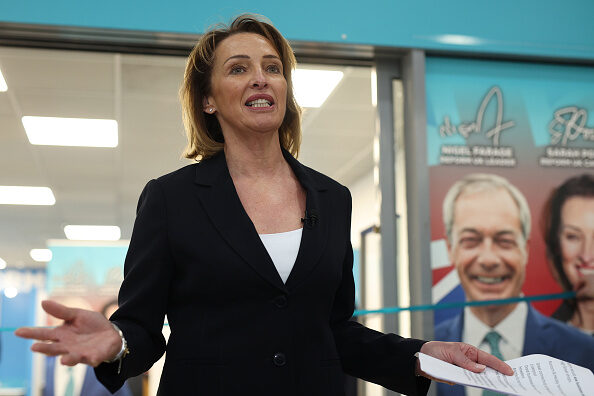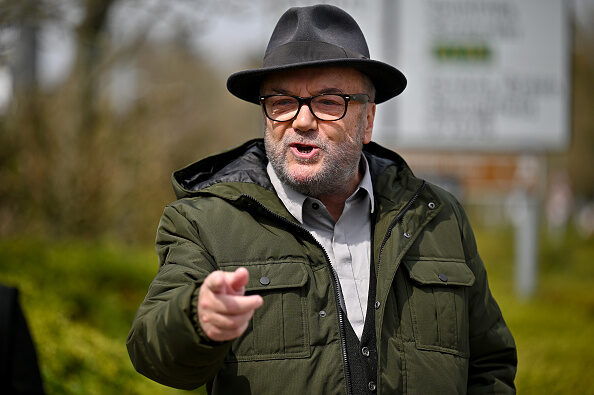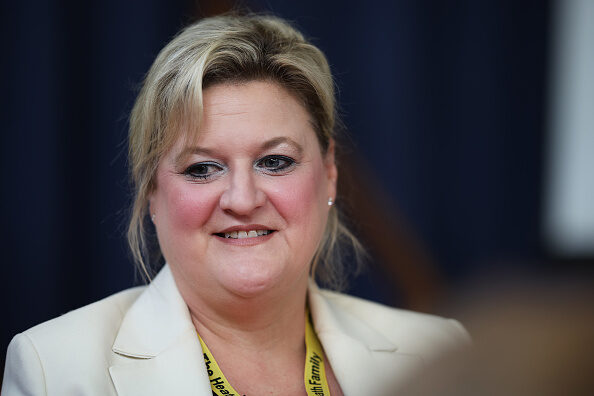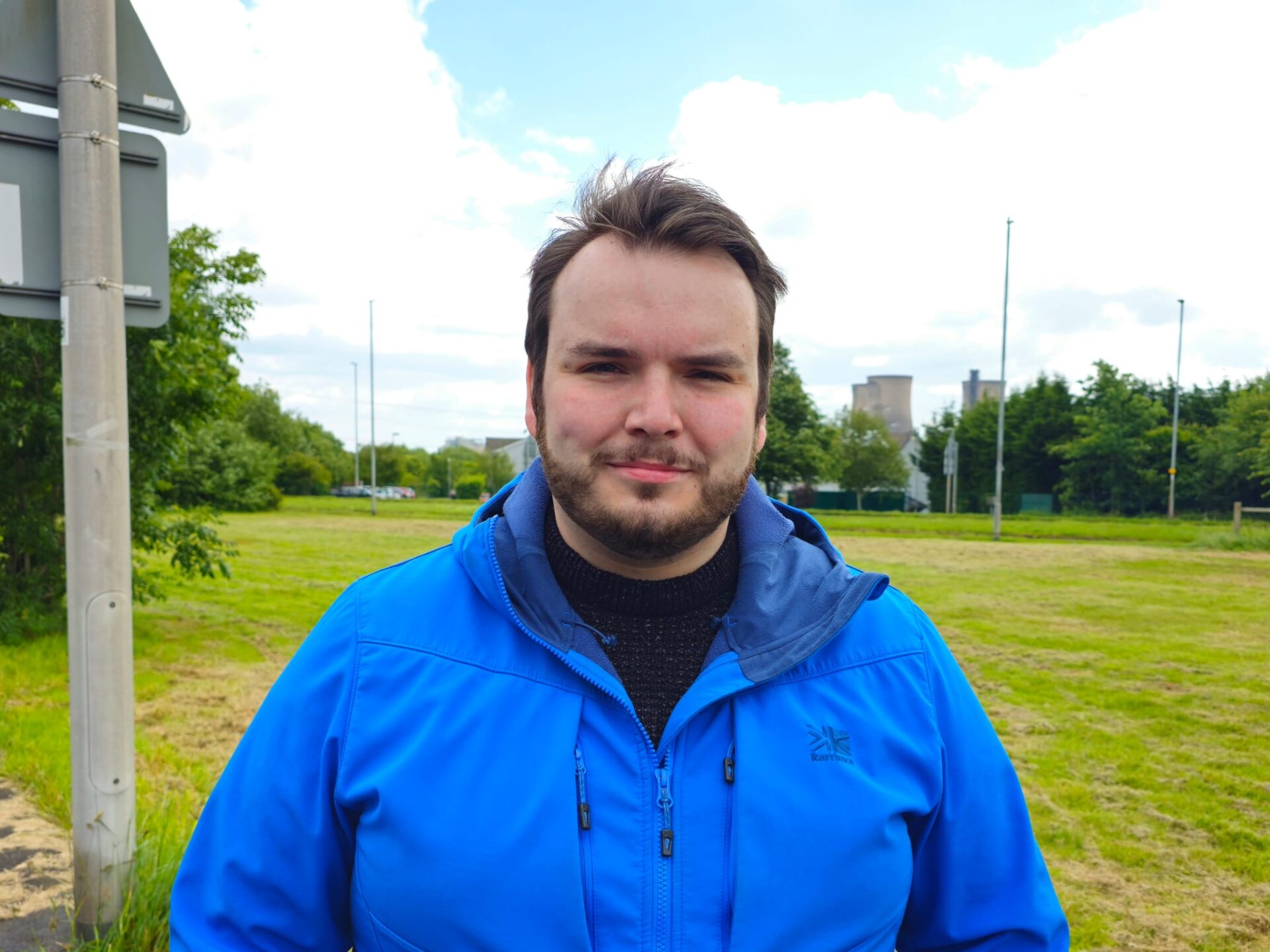In the Ferry Boat pub in Runcorn, yards from the River Mersey, they are naming broken promises like jilted lovers. “Labour promises everything,” says a man, “and when they get in it is exactly as it was in the beginning. Veterans sleep in tents. Muslims pray in streets. Natives can’t get operations. Immigrants get them straight away. It’s easy over here. Free this, free that. If World War Three starts who is going to fight for us? Will they be in the British army? Will they hell. You don’t know people anymore.” This is why Reform think they will take Runcorn and Helsby from Labour in the by-election tomorrow.
A girl, young and raging, interrupts. “England should focus on English people.” She resents the people who come on the boats, and hates the man who killed three girls in Southport, 30 miles north, last year. “If I went to their country and did that I would be shot in the head,” she says. (The murderer is a British citizen.) She believes public services are given to foreigners but denied to her. She says she knows people who would rather be in prison than wait for a house: their ambition has shrunk to that. She is absolutely alienated from her democracy, and at the age of 19.
“Stop it,” says her mother softly, “It’s not their fault.” Still, she has “no hope” either: her home was broken into last week, and the police didn’t turn up, even though she has footage of the crime. I ask her: when is the last time you had hope? “2016,” she says. Brexit.
This Cheshire constituency is a patchwork: there’s Labour Runcorn, a small town, pretty Frodsham and villages that leant Tory in the past. There is industry here, and housing is cheap, but public services are failing and wages are low. In Runcorn they speak with alarm at benefit cuts for the elderly; in the villages they oppose taxing farmers.
The story began in October in Frodsham, a town named in the Domesday Book. Mike Amesbury (majority 14,696, Reform second, the Tories just behind) attacked a constituent outside District Taxis, which is now a minor tourist attraction for this reason. He was jailed for 10 weeks — suspended on appeal — and resigned from the Labour Party. It was, though unwittingly, a paradigm: an eruption of violence in an English paradise; perhaps an omen of things to come. “I don’t recognise myself,” Amesbury said later, and now his constituency mirrors him.

Amesbury drank that night in the Cholmondeley Arms, where here I find men as politically alienated as the girl in Runcorn, though more amiable, being half drunk. “He was always in here,” says one. “He was always pissed. He was a useless MP. Labour are Labour.” He rolls his eyes. “Gobshites.” Another says, “Farage reminds me of Arthur Scargill,” which is eerily true: both can be pulled out of a lineup; both function as brands. He grins, and tells me he thinks Farage’s clothes are absurd. Amesbury still has supporters: one man tells me, “I would still vote for him. He’s a normal lad.” (As in: who hasn’t wanted to punch a voter?) Only one will admit to voting on Thursday: he supports the English Constitution Party, aggrieved English nationalists with a leader called Daddy Dragon. Within the laughter, these are men whose faith in conventional politics has gone.
Still, there is hope for Labour: some voters — older people, the young are bewitched by Farage’s TikTok and gift for selfies — defend the party, now it is threatened. I meet a raging Labour voter: “Nigel Farage comes from money,” he says. “He thinks he’s supporting the working man? He’s a million miles away. He’s a fucking gobshite.”
I find Tories at a tea dance in a normal-seeming village under an escarpment called Helsby Hill. This is a landscape of power stations and duck ponds: Mordor and the Shire. Here, Tories and once-Tories are dancing the Lambeth Walk. Two women tell me about Runcorn in their youth. “You knew your neighbours,” says one. “It was a small town with lots of activities going on: carnivals; May Queens; Whitsuntide, when all the primary schools used to walk with the banners. You knew people.” They talk like Rip Van Winkle in a ballroom: they fell asleep, and when they woke they knew no one, and no one knew them.
“I think I will remain Conservative,” says the other. “They’ve got a big few steps to cover, haven’t they? I don’t know if it’s gone too far to even pull back to how we would like it to.” An army veteran tells me that when he was growing up in Runcorn, it was so isolated that nearby villages “were foreign countries. Runcorn was a working town then. We had three tanning yards, a gas works, and two cinemas. Now England is a foreign country.” He has always voted Conservative, but tomorrow, he will vote for the independent Alan McKie, who lives in Helsby, and organised the tea dance. “The Conservatives spend all their time fighting one another. They have done nothing.” And they split, and split again.
“Under the laughter, these are men whose faith in conventional politics has gone.”
Others are more proactive. Stand Up to Racism is standing up to Reform all over the north, and near Iceland in Runcorn. They hand out Unmasking Reform leaflets, with a photograph of Farage laughing near a horse. They tell voters he is a stockbroker; that he is a threat to the NHS; that he blames the cost-of-living crisis on refugees, migrants and Muslims. The response is muted. A young father, holding two toddlers by the hand, is aggrieved by their message that Farage is a racist: it means he is too. His cheeks flush in anger. “Farage won’t destroy the NHS,” he says, “it’s political suicide.” He looks aghast, hurt even. Even so, women thank them for coming; a few cars beep their horns, though gently.
They are the trumpets for George Galloway. The leader of the Workers Party replaces Stand Up to Racism near Iceland with Peter Ford, his deputy leader and by-election candidate. Ford was British ambassador to Syria and Bahrain and then worked for UNRWA in Palestine. Galloway’s small huddle of supporters is the most conventional politicking I have seen in Runcorn. They are like creatures from another age. Galloway, though, with his offer of socialism and social conservatism — no cuts, no foreign wars — loves conflict. When a bystander calls him a cunt, he invites him to ask a question, and seems faintly disconsolate when he does not.

Galloway’s nemesis is Labour, the party he once loved. He says they have “a mark of death” upon them: opening the door to Reform with their incompetence and malice; inviting pensioners to kill themselves. But he despises Farage too. “What’s the point of Nigel Farage’s politics?” he asks. “And, by the way, it’s an affectation, because I’ve spent time with him. I know he’s not a racist. It’s much worse than that. He deliberately uses racism to get votes while actually not being one himself.” Farage’s Britain, he says, “would be a Britain torn apart. This is a contest between blue Tories, turquoise Tories and red Tories. They all stand for the same thing. If an arse could have three cheeks they are it.”
There is a hustings, at last, at St Paul’s church in Helsby, and it is full. The main candidates sit in a semi-circle of anxiety, though the minor and novelty candidates are more relaxed, having less to lose. Karen Shore of Labour, a teacher, looks tired but resolute. Sean Houlston for the Tories looks like a man whose hinterland evaporated when his back was turned. Sarah Pochin for Reform — previously a Tory councillor and magistrate — is very beautiful. Reform has a developing female aesthetic and it is borrowed from Fox News.
The vicar names the rules: no heckling, no recording, all questions submitted in advance. “We are in the house of God,” he says. “We follow someone who challenged the authorities of the time and was killed for being different. But he preached: love one another.” “This,” he points at the candidates, “is a human being. This is a person.” I sit with friends of Daddy Dragon (Graham Moore). Some political parties are sexual fetishes grown large.

The questions are blunt: the vicar reads them out. The answers, from the main candidates at least, are small, and without vision: as if vision is a deadly thing. Asked if the Tory Party is dead, Houlston talks about fixing roads and green spaces, which seems like an affirmation of the question. Shore offers more GP appointments, and a named police officer for each area. During the 2024 election campaign, Starmer asked the people for 10 years. If Runcorn falls, he won’t have 10 months.
Pochin, asked what Reform’s policies are besides immigration, answers in wordcloud: she sounds like an incumbent already, and that will be a problem for Reform soon. It says: Family, community, country. She is sensitive, too, as politicians often are: she tells an audience member, “I don’t think you should be shaking your head.” But why not?
The minor candidates are more interesting, being eccentrics. I met John Falch from Rejoin EU — the candidate’s agent and stand-in — outside the chippie Oh My Cod before the hustings. “I’m half-Norwegian and half-British by parentage,” he told me. “Made in Italy. Born in Worcestershire. Schooled in Belgium. The referendum literally took my identity.” He says a similar thing in the church, and waves an EU flag while nationalists — definitely Reform and the English constitutionalists, possibly some Tories, though they should know better by now — hiss at him.
Daddy Dragon asks why the English, of all the British nations, are singularly oppressed. He says that, though a Londoner, he identifies with Runcorn and Helsby constituents because he too lives next to an incinerator. Michael Williams, a grave independent, says: “If you climb to the top of Helsby Hill you can see the whole world.” He is standing so his children, “know the democratic process is not for other people”.

The atmosphere beyond is sadder, though; poorer; angrier and more confused. There is what feels like recklessness here, born, I suspect, of grief, because we now are, and explicitly feel, like a declining country with no obvious path ahead. Locals may despise Farage but some of them will vote for him anyway. Some of them will vote for him because they despise him: plain decadence. I meet a Sudanese-born taxi driver who says he will vote Reform: “And 90% of what they [Reform] say they will do: they aren’t going to do it anyway.” All this, he says while laughing.
As I leave Runcorn, I meet an Iraqi-born British citizen, sitting on a bench, smoking. He has a master’s degree in finance, “but it hasn’t served me well. I’m a barber.” I ask about his politics and he quotes Plato: “The price good men pay for indifference to public affairs is to be ruled by evil men.” I ask if he fears racism and he says not: this is the safest country he has lived in, and British people are gentle at heart. He tells me that Farage provides, “a surface level logic” and “a turnkey solution to an existing problem” but he thinks he will drift away, as populists do.
There is rage here, of course, but what is most pointed is disaffection: the growing idea that conventional politics cannot give you what you want. Labour may hang on — Pochin is cold for Cheshire — but, if they do, it will be in inches. It is not Labour, but the system itself that is mistrusted. Of all the people I meet in Runcorn the barber has the most hope but, Plato or no, he will not vote on Thursday. Plato was for another time, he says; a customer comes for a haircut, and off he goes.
















